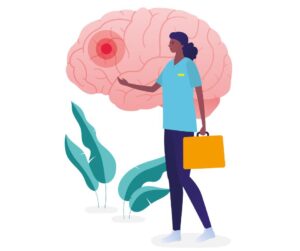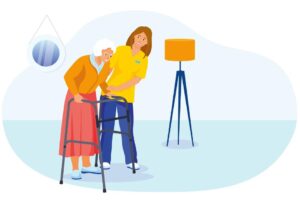Dementia with Lewy bodies
What is dementia with Lewy bodies (DLB)?
Lewy bodies are named after the German doctor who first identified them. They are tiny deposits of a protein that appear in nerve cells in the brain. Researchers do not have a full understanding of why Lewy bodies appear, or exactly how they contribute to dementia.
However, this is linked to two factors:
- Low levels of important chemicals (mainly acetylcholine and dopamine) that carry messages between nerve cells
- A loss of connections between nerve cells, which then die.

Do Lewy bodies cause Parkinson’s disease?
Lewy bodies are the cause of both Dementia with Lewy Bodies (DLB) and Parkinson’s disease. They are two of several diseases caused by Lewy bodies that affect the brain and nervous system and get worse over time. A person with Parkinson’s disease is at high risk of going on to develop dementia (Parkinson’s disease dementia) as their condition progresses. Dementia may be more likely in a person who has developed Parkinson’s later in life or who has been living with it for several years.
What are the common symptoms of DLB?
Problems with attention and alertness are very common in DLB. An important feature of the condition is that these problems may switch between being bad and then better – or the other way round – over the course of the day, by the hour or Dementia with Lewy bodies even a few minutes. Someone with DLB may stare into space for a long time or have periods when their speech is disorganised.
People may also have difficulties judging distances and seeing objects in three dimensions. It is common to struggle with planning, organising and decision-making. Visual hallucinations also occur frequently in people with DLB, often in the early stages of the condition. They can happen daily. Visual hallucinations are often of people or animals, and are detailed and convincing to the person with dementia. They can last several minutes and may be distressing. (Someone may also have visual misperceptions, such as mistaking a shadow or a coat on a hanger for a person.) Auditory hallucinations – hearing sounds that are not real, such as knocking or footsteps – can happen but are less common.

Why do people living with DLB have delusions?
Hallucinations and visual misperceptions partly explain why most people with DLB have delusions (persistently thinking things that are not true) at some stage. Some common delusions held by people with DLB are believing that someone is out to get them, that there are strangers living in the house, or that a spouse is having an affair or has been replaced by an identical imposter. This can be very distressing for the person and the spouse.
Can DLB impact a person’s mobility?
Up to two-thirds of people with DLB have movement difficulties when the condition is diagnosed, and this number increases as DLB progresses. These symptoms are similar to those of Parkinson’s disease, and include slow and stiff (rigid) Dementia with Lewy bodies movement with a blank facial expression. The person’s posture may be stooped and their walk may be shuffling. They may also have difficulty with their balance, and their limbs may sometimes tremble. Movement problems are one reason why a person with DLB is particularly prone to falls.

Does DLB impact sleep patterns?
Sleep disturbance is another common symptom of DLB and may start years before the diagnosis. Someone with DLB may fall asleep very easily during the day, but have restless, disturbed nights. In the most common night-time sleep problem, the person has violent movements (eg yelling, hitting out) as they try to act out nightmares.
What are other symptoms of DLB?
Some people with DLB lose their sense of smell, become constipated or have urinary incontinence (passing urine when they don’t intend to). They may also faint or have unexplained episodes when they lose consciousness for a few minutes. As the disease progresses, problems with day-to-day memory and other mental abilities become more similar to those of middle- or later-stage Alzheimer’s disease.
People can also develop behaviours that are challenging for those around them (eg agitation, restlessness, shouting out). Worsening movement problems mean that walking gets slower and less steady. As a result, falls become more common. In the later stages of DLB, many people have problems with speech and swallowing, leading to chest infections or risk of choking. Eventually, someone with DLB is likely to need a large amount of nursing care.
Our approach to dementia care at Four Seasons Health Care Group.
Get in touch
If you have any questions about our care or services, please get in touch below.
Please note that we cannot respond to queries about application process, or current vacant positions. Please visit our careers website for information about working with us or current vacancies.

